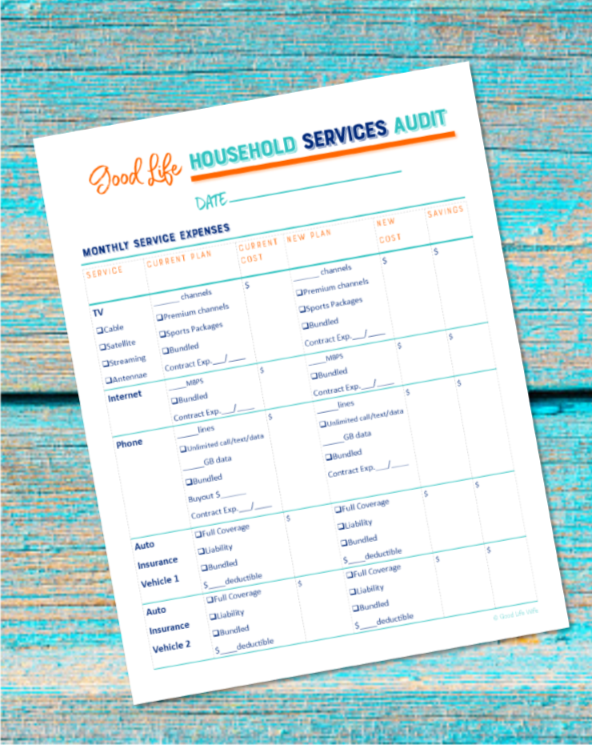 Do you feel like you’re overpaying for things? Or do you just need to find places to cut back? Great news!! You can learn how to save money on your bills and it’s going to be easier than you think.
Do you feel like you’re overpaying for things? Or do you just need to find places to cut back? Great news!! You can learn how to save money on your bills and it’s going to be easier than you think.
We’re going to focus on the money we spend on services every month, like TV, internet, phone and auto insurance. These services are typically the most negotiable and easiest to change. If you call your power company and ask for a better rate, they’re not super likely to offer you one! But services are competitive and it costs companies a lot to lose a customer so they might just be willing to cut you a deal to keep you.
Household Services Audit
First, let’s find out exactly what you’re spending and what you’re getting for your hard-earned money. If you would be so kind as to give me your email address and subscribe to my newsletter, you’ll get access to this free Household Services Audit printable. Click here to jump on board. If you’re not into getting awesome newsletters that will crack you up and give you useful tips, no biggee. You can totally copy off my paper and make your own. ‘Kay, go print it out…
TV Watching
Whether it’s cable, dish or streaming, you’re probably watching some TV. Unless you’re one of the, “we don’t watch TV in our home” people. That’s cool, you do you. But the rest of us need to save money on the mindless TV we’re binging on.
The average U.S. household spends about $72 to watch TV with a paid service, according to CableTV.com. Basically, if you’re spending less than 30 cents per channel, you’re getting a good deal. Also, this average is for the introductory price most companies offer. When the discount period is up, your cost will go up too.
Hop online and pull up your TV bill. Enter in the information on the Household Services Audit: type of service, number of channels, whether your package includes premium channels or sports packages, is a bundled service and when the service contract period ends.
Internet
Unlike TV, having internet access is pretty much a must. It’s like having electricity and running water. I really can’t remember the last time I met someone who didn’t use the internet, can you?
The average cost for monthly internet service is about $50 in the U.S. It’s more if you want super fast speeds and may be a bit less if you have a bundled service.
Take a look at your internet bill and enter the information on the Household Services Audit: speed in MBPS, whether it’s a bundled service and when the service contract ends.
Phone
Having a phone is another necessity. All three people in my family have a phone but we don’t have a land line. I got rid of our land line years ago and have never missed it. The only calls you ever get on a land line are from telemarketers and maybe your grandma.
Cell phone bills are climbing and a recent J.D. Power & Associates report noted that the average monthly individual bill was $71 for U.S. customers. Again, you may pay a little less with a bundled service.
Now enter the info about your phone bill on the Household Services Audit: number of lines, if you have unlimited talk, text or data, how many gigs of data you have, the cost to buyout the contract if you have financed your phone, if it’s a bundled service and the contract expiration date.
Auto Insurance
The cost of car insurance can vary greatly between states, genders and ages of drivers. The average monthly cost is $76 according to ValuePenguin. (Just an observation, but “ValuePenguin” isn’t a name that inspires a lot of confidence in financial knowledge. Do penguins know a lot about money? Do they even have insurance?)
Grab your audit form and enter: type of coverage, whether it’s bundled with your home owner’s insurance and the deductible.
How to Save Money
Finally! Whew, we had go through a bunch of words to get here, huh? Here’s the good stuff…
TV, Internet and Phone
As these services are often bundled and many are offered by the same providers, I’m going to group them together.
First take a look at your must haves. We watch a lot of network TV, so we need local stations. You might think we could get away without a paid service and just usea high definition antennae. Not so fast, ’cause ESPN. Yep, if you need to be able to watch all the sports all the time, ESPN will force you into some type of paid service. If you don’t need ESPN, take a look at alternatives to cable or dish. You can stream lots of channels for a much lower price. But, you need to make sure you have good internet if you go with a streaming service.
Which brings me to the internet. How fast do you need? A good rule of thumb is 20 mbps per user if you’re going to be streaming video. You need a lot less if you’re just using it to get email and look at web pages and you’ll need a bit more if you’re a serious gamer.
Do you really need unlimited everything? If you have a teenager, the answer is probably. I know families that have metered use but you have to monitor usage and deal with the fall-out when they’ve used all of the their data 10 days into the billing cycle. A big expense here of course is the actual phone. Financing a 12-year-old’s phone for 24 months seems like a bad idea, so keep that in mind.
Savings tips:
Just ask. I just saved $30 a month on my DirecTV bill without even asking! I went to the online chat and asked when my service contract ended. That was enough for them to offer me a discount for 12 months. Who knew?! Try that method or just ask your service provider how you might cut back on your bill. It’s also a good idea to have information about offers from other providers on hand to share. They say to never take the first offer because the next one will always be better. I’m kind of a chicken though, and I just took my $30 discount and felt great about it!
Bundle. Most times, bundled services are discounted. Beware of getting services you don’t need, like a land line. Getting something you don’t need isn’t really saving money.
Switch. The introductory price for switching to a different provider will usually be way lower than a plan you’ve been using for awhile. Do the math though. Make sure the savings will be more than any expense you’ll have by switching. Lots of people switch every time their contract is up. Don’t be afraid to ask a potential provider if they will buy you out of your existing contract as many will.
Talk to a Live Person. Most sales people for new service and retention people for existing service have the ability to negotiate. Be nice and ask politely for what you want. Let them feel like they’re helping you and tell them how much you appreciate it. You catch more flies with honey. Just don’t be so nice they talk you into buying a bigger package!
Auto Insurance
Saving on insurance probably isn’t going to be as easy as just calling up and asking for a better rate. But, it’s a good idea to start with your current agent. Call them and ask them how you can save. If your financial circumstances have changed for the better, it might be a good idea to raise your deductible. This will lower your monthly payment but you’ll have to pay more if you get into an accident.
Independent insurance agents work with many insurance providers. They are able to find you the best deal by comparing prices and coverage.
Armed with the information on your current policy as well as the vehicles and drivers you need to insure, the next step is to get on the internet. Some companies will actually give you a quote online.
Most will seem like they’re going to give you a quote online then, surprise, they’ll call you with a quote. In fact, while researching this post, I foolishly entered my phone number in a “we’ll give you a live quote” deal and my phone has been blowing up all afternoon. Some sites make money from gathering your info and selling the leads to insurance companies. Fun. Bottom line: if you really want to save, you’re probably going to have to talk to a real person.
Beware of the commercials that advertise that you’ll save $500 a year by switching. Many of the customers save money by buying different coverage with the new company. Less money for less coverage isn’t necessarily saving.
Now, go do your homework and save some serious money! If you’re looking for help with saving on groceries, take a look at How to Save Big Bucks on Groceries Every Week. If you’re thinking about back to school, check out How to Make a Smart Budget for Back to School.



Great post, Kim. I hate ‘playing games’ with the cable and internet companies. SO frustrating!
Yes! I wish they would all do business above board.
Hi Kim Mayo,
I am glad that I came across your Household Service Audit. Thanks for sharing the post. Not only Auto Insurance, every household needs an “Insurance” to protect themselves from all the hazards.
Thora Cassia recently posted…How Often Should My Chimney Be Cleaned?
Yes, Thora. That’s a lesson so many learned the hard way during Hurricanes Florence and Michael, who swept through our area.
It is a very informative post. the tips you have shared in this post is very useful. I would definitely try to follow your tips. thanks for sharing this information with us.
Great topic, this is a very informative post, really appreciate your work. Thank you so much for sharing this.
Kim, this is so helpful! Thank you.
Hey! Great article! Thanks for your money-saving tips!
Keeping up for records is one of the major solutions on how to monitor the expense and incoming money of households. Usually, both parents shared the budget home to take care of their finances. Household services are quite costly. However, if you monitor the budget you will determine how you able to overcome those expense as nothing bothers you.
Thank you for posting this thorough explanation of your choice of saving money on household services. My friend and I were discussing this very topic last week. We were each raised differently and were exploring the various pros and cons of having our young teens work a job when they were of age. This gives me more to think about.
Solar panel systems are a great way for you to save money, no matter your budget. If you can afford to pay the electricity bill every month, you can afford to install them 🙂
Thanks for the mention and linklove. Wow you’ve got great resources and interesting stuff here. I’ve bookmarked your site and will be back for sure. Keep in touch.
Hey, thanks! By the way – according to Energy.gov, the better way to save money on heating bills is to set back the temperature of your home at least 8 degrees for 8 hours or longer. In fact, you can save 1% on your heating bill for every degree that you lower the thermostat 🙂
ESCO recently posted…New Furnace Installation in Tooele, Utah
I am so glad to find this valuable tips which helped me potentially save money on car insurance policies. The approach is so simple but I have to do it to be financially worry free. I also contact with the Independent insurance agency which you mentioned in your article. From this article I easily contact with them and learnt many things about auto insurance regarding prices and coverage. Thanks for sharing this informative tips!
Helpful reading to save money with a household services audit! I am going to share this post with my small brother. He was looking for this type of information. Thanks and keep up the good work!
These tips are really informative and helpful. I would like to try this. Thank you for sharing.
All the best!
Very informative – thank you!
To save money on auto insurance, I searched for an insurance agent who would help me out by giving me the exact information. Having this article, I was glad and got the right direction to find the best deal by comparing prices and coverage. Thanks.
This is the appropriate method you mentioned for saving money on auto insurance. I have been looking for a long time and finally found it. Thanks for sharing this helpful post, which is worth reading and admiring.
I recently decided to explore ways to cut down on my insurance costs, and your suggestion to start with my current agent resonated with me. It never occurred to me that a simple conversation could potentially lead to savings. I’ll definitely give them a call and inquire about any available discounts or adjustments that might be suitable for my current financial situation. Thanks for sharing these valuable tips on saving on insurance.
I appreciate your thorough analysis of the local housing market! The rising prices can be concerning for potential buyers. What do you think will happen in the next few years? Will we see a correction? Your perspective is always valuable. Thanks for keeping us informed!
honestdoor.com